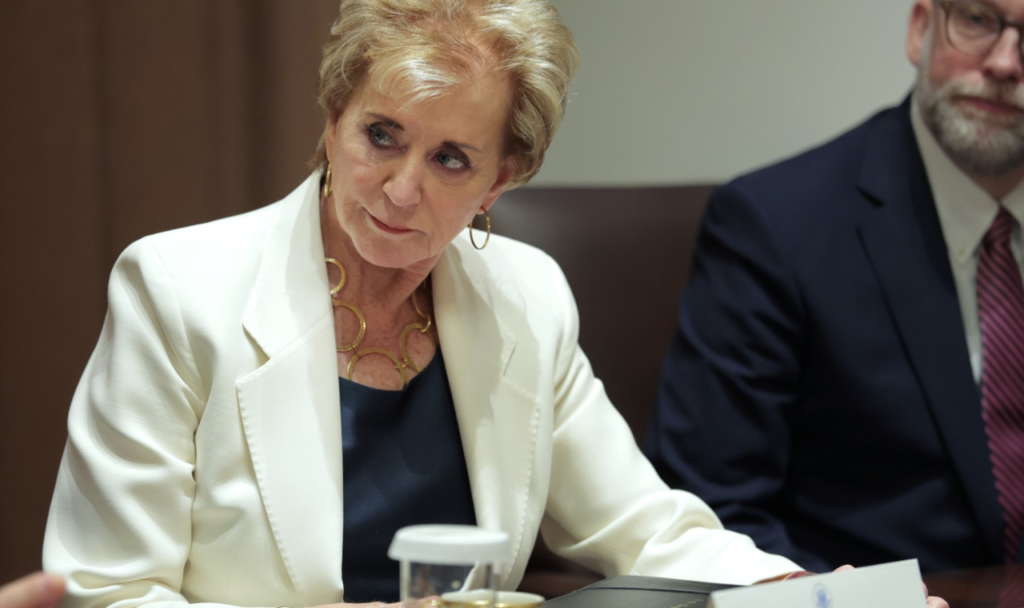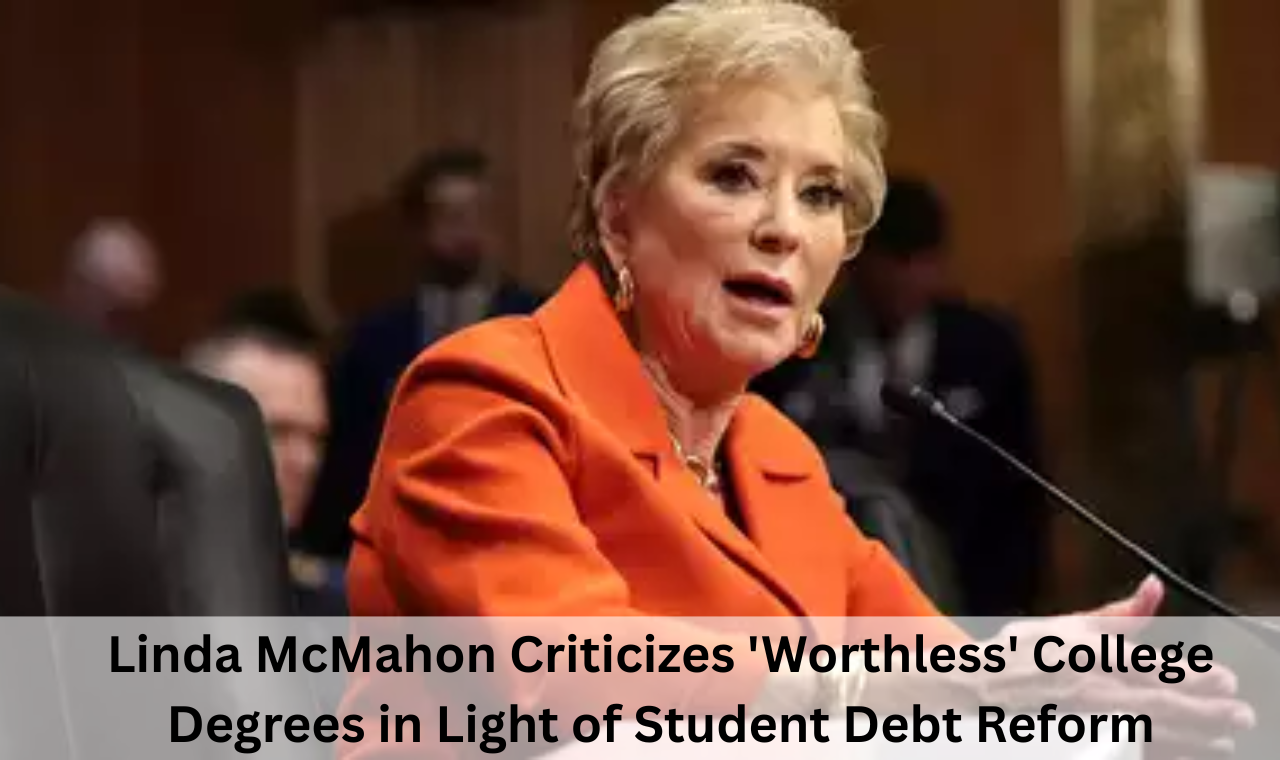In a recent opinion piece published by the Wall Street Journal, Linda McMahon, former U.S. Secretary of Education under President Donald Trump, raised concerns about the value of certain college degrees, particularly in the context of student debt reform. McMahon, who was confirmed to the Cabinet position in 2017, has been an outspoken critic of government policies aimed at alleviating student loan burdens, including President Joe Biden’s student loan forgiveness programs. Her latest remarks, which were also shared in Newsmax, have ignited a heated debate surrounding higher education, student loans, and accountability in American universities.
The Criticism: “Worthless” College Degrees
McMahon’s key assertion in the Wall Street Journal article is that many degree programs offered by colleges are “worthless” in terms of providing students with the skills and job prospects necessary to repay their student loans. She argues that despite the heavy financial investments required for these degrees, many students graduate without clear career paths. This is particularly troubling, she notes, given that federal student loans are often used to finance these programs, contributing to mounting debt.
- McMahon claims that colleges continue to enroll students in degree programs with low employability.
- She argues that these programs encourage borrowing without leading to meaningful career opportunities.
- McMahon points to the rising student debt burden and the lack of sufficient return on investment for many degrees.
“Colleges continue to enroll students in these programs and encourage borrowing to finance them,” McMahon writes. “But these degrees do not lead to viable employment opportunities that justify the cost.”
Her criticism underscores a broader issue in the debate over higher education in the United States. Over the years, the cost of college has skyrocketed, leading to a significant increase in student debt. According to the Federal Reserve, as of 2023, U.S. student loan debt surpassed $1.7 trillion. Yet, McMahon’s argument suggests that the system is failing to deliver on its promise of a higher education that translates into better job prospects for graduates.
Student Loan Forgiveness: A ‘Political’ Move?
In addition to calling out certain college programs, McMahon also took aim at the student loan forgiveness policies championed by the Biden administration. These policies, which were designed to cancel a portion of federal student loan debt for borrowers meeting specific eligibility criteria, have been a point of contention since their introduction.
McMahon has long criticized these measures, which she views as unsustainable for both taxpayers and the students benefiting from them. She argues that they create a false sense of financial security for borrowers without addressing the underlying issue of student loan dependency.
- McMahon believes student loan forgiveness programs are politically motivated.
- She argues that they give borrowers false hope, leading them to accrue debt with little intention of repaying it.
- McMahon claims the programs are unfair to taxpayers and those who have already repaid their loans.
“Loan forgiveness programs like those introduced by President Biden are politically motivated,” McMahon writes. “They give students the false hope that they can accrue debt with little intention of repaying it, which is unfair to both taxpayers and those who have already paid off their loans.”
The Biden administration’s loan forgiveness plans have been aimed at providing relief to individuals who are struggling to manage their student loan debts, with the intention of reducing financial strain and promoting economic stability. However, critics like McMahon believe that the policies only exacerbate the problem by encouraging further borrowing and increasing the burden on taxpayers.

The Trump Administration’s Approach: Accountability and Transparency
McMahon’s viewpoint aligns closely with the Trump administration’s stance on student loans and higher education. Under Trump, the Department of Education sought to hold borrowers accountable for their loans while simultaneously increasing scrutiny on higher education institutions. McMahon has consistently argued that colleges and universities should be held more responsible for their students’ financial outcomes, emphasizing transparency and the need for clear communication about the potential return on investment for degree programs.
- McMahon advocates for accountability from both borrowers and higher education institutions.
- She emphasizes the importance of transparency in colleges’ communication about the financial outcomes of their programs.
- The Trump administration sought to restart federal student loan repayments to promote responsibility among borrowers.
As part of this philosophy, the Trump administration had planned to restart federal student loan repayments in 2025 after a temporary pause during the COVID-19 pandemic. On May 5, 2025, borrowers will once again be required to make payments on their federal student loans, affecting millions of Americans who have been on pause for nearly three years. McMahon has been vocal in her support for this move, as it aligns with her belief that borrowers must take personal responsibility for their loans.
However, McMahon’s calls for greater accountability have been met with resistance from advocates who argue that this approach disproportionately affects borrowers who were already financially vulnerable before taking out student loans. Critics argue that many students, particularly those from low-income backgrounds, enter college with little understanding of the financial burden they will face post-graduation, only to find themselves with unmanageable debt loads that are not easily repaid.
A Controversial Debate: Is It Time to Rethink College?
McMahon’s remarks have sparked a larger discussion about the value of a college education and the role of the government in managing student debt. Supporters of McMahon’s position argue that reform is necessary to address the rising costs of education and to ensure that students are not burdened with debt for degrees that do not improve their economic mobility. Proponents of student loan forgiveness policies, on the other hand, emphasize the importance of providing relief to borrowers who pursued education in good faith but are now trapped in a cycle of unmanageable debt.
- Supporters of McMahon argue that higher education must be reformed to address its increasing costs.
- Critics of McMahon’s position worry that the administration’s approach unfairly penalizes borrowers.
- The debate is rooted in the balance between financial responsibility and providing relief for vulnerable students.
As McMahon notes, while the administration seeks to hold borrowers accountable, there is also an expectation that colleges and universities be transparent about the outcomes of their programs. This includes providing clearer data on job placement rates and potential earnings for graduates.
For further information on student loans, the Department of Education offers resources through their website here. The Federal Reserve’s student loan debt statistics can be explored in detail on their official page.
Conclusion
As the debate over student loans and higher education continues to unfold, McMahon’s criticism highlights a growing concern about the long-term sustainability of federal loan programs and the quality of education provided by many institutions. Whether or not her stance will influence future policy decisions remains to be seen, but one thing is clear: the conversation surrounding student debt reform is far from over.

Pankaj Kumar is a skilled content writer at OTE News, focusing on breaking news, technology, and socio-political developments. With a background in Mass Communication, he brings a balanced perspective to his articles, ensuring clarity and reliability. Pankaj has a knack for simplifying complex topics for readers.
In his free time, he enjoys photography, traveling, and experimenting with new cuisines. His curiosity and dedication to truthful reporting make him a valuable contributor to OTE News.




